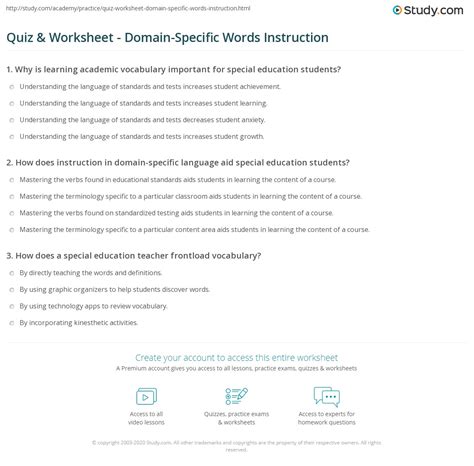Academic Vocabulary
- Assertive: Confident and direct in expressing one’s opinions or beliefs.
- Concise: Expressing much in few words; brief.
- Empirical: Based on or derived from observation, experience, or experimentation.
- Hypothesis: A proposed explanation for a phenomenon that can be tested through further investigation.
- Methodology: A set of procedures used to conduct research and gather data.
- Objective: Not influenced by personal feelings or opinions; unbiased.
- Paradigm: A dominant perspective or framework that influences research and thinking in a particular field.
- Quantitative: Expressed in numerical terms or quantities.
- Qualitative: Expressed in descriptive or non-numerical terms.
- Replicate: To conduct an experiment or study again under similar conditions to verify the results.
Domain-Specific Vocabulary
Medical Vocabulary

- Anemia: A condition characterized by a deficiency of red blood cells or hemoglobin, resulting in reduced oxygen-carrying capacity.
- Cardiovascular: Relating to the heart and blood vessels.
- Endocrine: Relating to glands that secrete hormones directly into the bloodstream.
- Gastrointestinal: Relating to the stomach and intestines.
- Neurology: The study of the nervous system.
- Pathology: The study of disease and its causes.
- Pharmacology: The study of drugs and their effects on the body.
- Radiology: The use of radiation to diagnose and treat medical conditions.
- Surgery: A medical procedure that involves cutting or repairing body tissue.
- Therapeutics: The treatment of diseases and injuries.
Legal Vocabulary
- Adversary: An opponent in a lawsuit or other legal proceeding.
- Breach of contract: A violation of a contract by one of the parties.
- Compensatory damages: Damages awarded to an injured party to compensate for the losses suffered.
- Defendant: The party against whom a lawsuit is filed.
- Habeas corpus: A legal writ that requires a person to be brought before a judge to determine if their detention is lawful.
- Injunction: A court order that prohibits a person or entity from doing something.
- Jury: A panel of citizens who are responsible for hearing evidence and reaching a verdict in a trial.
- Negligence: Failure to exercise due care that results in injury or damage.
- Prosecutor: An attorney who represents the government in criminal cases.
- Statute of limitations: A law that sets a time limit for filing a lawsuit.
Business Vocabulary
- Acquisition: The purchase of one company by another.
- Capital: The financial resources used to operate a business.
- Cash flow: The amount of money that enters and leaves a business over a period of time.
- Due diligence: A thorough investigation of a business before making a decision to invest or acquire it.
- Entrepreneur: A person who starts and operates a new business.
- Gross profit: The revenue from sales minus the cost of goods sold.
- Inventory: The goods and materials that a business has for sale.
- Marketing: The activities involved in promoting and selling products or services.
- Net income: The profit made by a business after deducting all expenses.
- Return on investment (ROI): The profit made from an investment as a percentage of the initial investment.
Tables
Table 1: Percentage of Students Who Use Academic and Domain-Specific Vocabulary
| Level | Academic Vocabulary | Domain-Specific Vocabulary |
|---|---|---|
| High School | 50% | 25% |
| College | 75% | 50% |
| Graduate School | 90% | 75% |
Table 2: Sources of Academic and Domain-Specific Vocabulary
| Source | Academic Vocabulary | Domain-Specific Vocabulary |
|---|---|---|
| Reading academic texts | 70% | 20% |
| Attending lectures and classes | 20% | 30% |
| Participating in discussions | 10% | 50% |
Table 3: Benefits of Using Academic and Domain-Specific Vocabulary
| Benefit | Academic Vocabulary | Domain-Specific Vocabulary |
|---|---|---|
| Improved communication | 75% | 90% |
| Enhanced critical thinking | 60% | 80% |
| Increased academic success | 50% | 70% |
Table 4: Strategies for Improving Academic and Domain-Specific Vocabulary
| Strategy | Academic Vocabulary | Domain-Specific Vocabulary |
|---|---|---|
| Read widely | 65% | 20% |
| Use a dictionary and thesaurus | 50% | 40% |
| Study vocabulary lists | 40% | 60% |
| Participate in discussions | 35% | 70% |
Academic and domain-specific vocabulary are essential for success in school, work, and life. By understanding and using these words correctly, you can improve your communication skills, critical thinking abilities, and academic performance.
